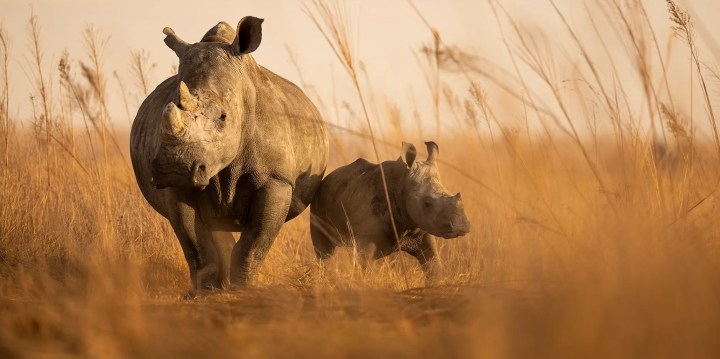WILDLIFE WARS
Private rhino owners mull legal challenge to phasing out of captive breeding operations

The Private Rhino Owners Association, whose members own most of South Africa’s population of white rhinos, is considering a legal challenge to the government’s decision to phase out the intensive and captive breeding of the species for commercial reasons.
Private Rhino Owners Association (Proa) chairman Pelham Jones told Daily Maverick in an interview that the association was looking at challenging the policy in court on the grounds that, as affected parties, the input of private rhino owners had been ignored by the Department of Forestry, Fisheries and the Environment (DFFE).
“If there is no change in policy, then we may have no options left but to go to court. We are considering litigation on the basis that we, the affected party, have made numerous submissions on numerous gazette notices, and time and again our input was ignored,” Jones said.
He also noted that Proa was not part of the High-Level Panel that crafted and proposed the policy.
Cabinet last week agreed to end the captive breeding of rhinos for commercial purposes and of lions — practices that have stirred controversy, especially in the case of the big cats and the canned lion hunting industry.
Read more in Daily Maverick: Cabinet approves end to captive breeding of lions and rhinos
Lion breeders signalled in January that they were also mulling court action over the policy.
Read more in Daily Maverick: ‘I’m a lion farmer. No one takes my lions’: Breeders threaten court action over industry closure
In the case of rhinos, the DFFE said in a statement last week that the aim was to “… phase out intensive management and captive breeding of rhinoceros for commercial purposes, and enhance wild populations”.
That is interesting because it makes no mention of phasing out captive breeding for conservation purposes — a potential rhino-sized loophole.
On the conservation front, some critics have raised concerns that captive breeding operations or captive breeding organisations (CBOs) might give rise to domestication or render rhinos unsuitable for rewilding. But several conservation scientists and rhino experts endorse the practice as a strategy for conserving the species.
An assessment by The African Rhino Specialist Group (AfRSG) of International Union for Conservation of Nature’s (IUCN) gave the CBO previously owned by John Hume — host to a population of 2,000 white rhinos — barely a passing grade for conservation value.
But it recognised that its contribution “… to southern white rhino conservation comes through contributing to global numbers and options linked to that”.
CBOs are recognised internationally for their role the conservation of endangered species.

Rhinos in the Eastern Cape. (Photo: David Silverman / Getty Images)
And the NGO African Parks bought Hume’s CBO last year with the specific intention of rewilding the animals, which effectively means transferring wildlife populations to ranges the species previously occupied.
Read more in Daily Maverick: Hume’s herd of 2,000 African rhinos get a last-minute ‘lifeline’ in major purchase and rewilding project
That means the CBO has no commercial purpose, but African Parks stated objective is to phase it out through rewilding projects.
Proa’s Jones told Daily Maverick that there are four registered CBOs for rhino breeding in South Africa that account for about 3,000 of the animals, or close to 25% of a national herd whose numbers have been plunging in the face of the poaching onslaught for the pachyderm’s horn which is highly coveted in Asian markets.
Proa estimates that about 8,000 white rhinos in total, or 65% of the national herd, is in private hands as the poaching crisis pivots to KZN’s state-run parks.
Read more in Daily Maverick: Two out of three SA white rhinos now in private hands while poachers decimate KZN herds
This private percentage has been growing steadily over the past two decades for the simple fact that private owners have done a better job of protecting their herds than the ones that occupy state-run reserves, despite swelling security and other costs.
Private game farms lost 93 of the pachyderms last year to poaching — less than 20% of the poaching total despite accounting for 65% of the population.
The ongoing slaughter on state reserves clearly makes the stated policy of “enhancing wild populations” problematic.
Against this backdrop, commercial incentives to privately own the animals are dwindling as fewer private game operators want to buy rhino while the global trade in rhino horn — which can be harvested through non-lethal methods and grows back — remains strictly banned.
The government has not shut the door completely on the reopening of the horn trade, but only for “conservation purposes”, with the commodity exclusively sourced from “wild” populations and only when “conditions become favourable”.
“South Africa will work with range states and potential destination countries (for rewilded South African rhinos) to support a proposal for international commercial trade in rhinoceros horn from protected wild rhinoceros, for conservation purposes, when conditions become favourable,” the DFFE statement said.
This would presumably mean de-horning “wild” populations — an anti-poaching measure — and selling the harvested horns to raise conservation funds.
It does raise questions about what counts as a “wild” rhino. Are rhinos on a large private reserve that are not intensively managed or classified as a CBO not wild?
One thing is certain: if the cabinet-approved policy of phasing out rhino CBOs is challenged by Proa in court, many issues will be examined and the stakes will be high. DM




















What classifies as captive breeding?
If I were lucky enough to own 30 rhino on a whatever size piece of heaven, and mine breed (as they are likely to do) : is that captive breeding?
“Cabinet last week agreed to end the captive breeding of rhinos for commercial purposes” So you can keep rhinos so long as you make no money out of them? Not even tourism? Muddled thinking mixed with anti-farmer and anti-private profit sentiment. The DFFE are going to “enhance wild populations”. WHAT?? The DFFE have presided over the catastrophic decline of rhino numbers. The DFFE are divorced from reality. When rhinos go extinct, they will no doubt blame private rhino owners.
This proposal is a very bad decision for conservation and simply ignores the fact that many millions of this country’s wildlife populations originated from surplus animals restored to beyond carrying capacity in protected areas or private sector farms. Good conservation supplies surplus animals which owners have every right to sell or use. The bill should be reconsidered by people with a knowledge of the wildlife industry and no animal rightists.
The private rhino owners took a gamble that the sale of rhino horn would be legalised and that they would stand to make huge financial gains. In the meanwhile, it has become impossible for them to fund their rhino breeding facilities – especially in the face of obvious security threats. Their gamble didn’t pay off. So, must rhino horn trade be legalised, because they need it for their business model?
If rhino horn trade is NOT legalized, then privately owned rhinos, which are expensive to keep, will gradually disappear. The state owned rhinos have largely gone already, so I suggest that you get over your aversion to people making money out of rhinos, and write to Creecy urging her to legalize the trade in rhino horns.
Let’s be honest people! This is just another corruption project for the ANC government! Mr Ram’a’Dick & Creecy have already announced there plans for the wildlife of South Africa. As soon as they can get the private sector out, the quicker they can go about destroying our wildlife just like they have destroyed the rest of South Africa!
Our present Government has been so successful in breaking down what took years to build. KZN Wildlife has failed dismally. Now you want to wreck what private enterprise has done. Don`t try to fix what is not broke. It will not take long to reduce the population of Rhino .
In 2022 I had the privilege of spending a few days at a game farm that has a fairly large herd of white rhino, as well as a variety of other game. The majority of the herd was de-horned but some were kept with their horns intact for hunting puposes. I personally am not a hunter, but I do realise that there is a place for controlled hunting. The farmer informed me that his herd has grown substantially since it was first introduced, to the point where the farm has too many rhino for the amount of land available. The owner of the farm stated that the farmers who have large herds of rhino are finding it more and more difficult to finance the keeping of these animals. Game farms are reluctant to buy rhino because of the risk of poaching. As a result, these game farms, that are ensuring the survival of the species, are finding it increasingly difficult to make ends meet. This particular farm has a state ot the art security system, with 24 hour surveillance by trained security personnel. In addition to this, the farmer spends a considerable amount of money in buying in fodder to supplement the available grazing on the farm. It was quite apparent that a lot of money has been put into this operation. If farms of this nature are no longer permitted to operate, what will become of our rhino popuation? The Kruger National Park is a prime example of what could, and probably will happen!